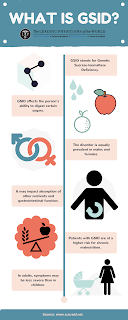Genetic Sucrase-Isomaltase Deficiency (GSID)

Sucrose or table sugar is a disaccharide that is made up of two simple sugars linked together by glycosidic bonds. The two simple sugars are glucose and fructose. Maltose is also another disaccharide made up of two glucose molecules. Human beings cannot absorb sucrose or maltose directly from the small intestines to the blood stream. Therefore, two enzyme known as Sucrase and Isomaltase are needed to cleave sucrose and maltose into glucose and fructose which are simple sugars (monosaccharide) that can be absorbed from the digestive track to the blood stream. If there is absence or low levels of sucrose and isomaltase, then a person is unable to break down sucrose or starch. What is GSID? Genetic Sucrase-Isomaltase Deficiency (GSID) is a rare genetic disorder that affects one’s ability to digest sucroseor maltose due to low levels or absence of two digestive enzymes, Isomaltase and Sucrase. Sucrase and Isomaltase are two enzymes that are associated with digestion of starch and ...
